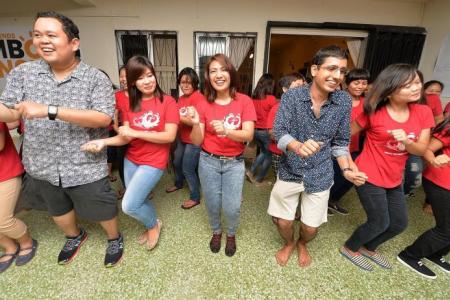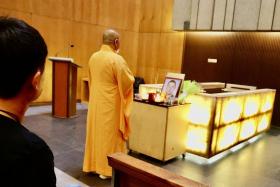Weekly mambo at Jalan Bumbong for foreign workers
Social entrepreneur invites foreign workers to his Woodlands home for weekly parties to build bridges between them and Singaporeans
Every Saturday, Singaporean Suraj Prakash Upadhiah welcomes migrant workers into his two-storey semi-detached house in Jalan Bumbong in Woodlands.
There, between 3pm and 7.30pm, they dance, cook and party.
The 28-year-old social entrepreneur, who co-founded social enterprise Air Amber, has been doing this for nearly a month with the help of friends, family and volunteers.
He even calls his home Bumbong Sunset.
His aim: To build bridges between Singaporeans and migrant workers.
The New Paper on Sunday joined one such session last weekend, along with more than 70 foreign domestic workers from Humanitarian Organisation for Migration Economics' (Home) shelter.
We saw the workers having a ball of a time, singing and dancing.
Mr Suraj, who lives with his father, tells TNPS: "We are opening our doors, rather than shutting them to transient workers."
Bumbong Sunset is part of his company's book project titled The Invisible Visible - Conversations Inspiring Hope, which features interviews with abused and marginalised migrant workers.
The book will be launched in December this year.
But Mr Suraj admits that Bumbong Sunset has also taken on a life of its own, as its core message of building friendships with migrant workers has resonated well with the volunteers, who are from several secondary schools and tertiary institutions.
He recalls how one of his relatives drastically changed her perception of migrant workers when she felt "the love and joy" that migrant workers bring to these parties.
Mr Suraj says: "Many volunteers came with the idea that they should pity these folk. But they soon realised that they don't need pity. They sing, they make music, they are just like us, they are people too and they can be good friends."
He is aware that Singaporeans sometimes exhibit xenophobia towards migrant workers. He hopes this project will eventually correct that.
"It is very easy for people, myself included, to make passing remarks when you drive past Lucky Plaza, for example, and say 'Look at all these foreigners'.
CONNECTION
"But as soon as you ask for their name and hear a little bit more about them, where they come from, what their hopes and dreams are, that is when the magic takes place because you start to have a connection," he says.
Mr Suraj isn't the only Singaporean trying to create a space for migrant workers.
In Little India, Mr Abdul Khaeer Mohammed Mohsin has been running Dibashram, a shelter that is also an art space and counselling centre for Bangladeshi workers, for the past five years.
The chief editor of local monthly Bengali newspaper Banglar Kantha says spaces like his are important for the workers' well-being.
He adds: "At Dibashram, they get the opportunity to interact and exchange ideas with Singaporean cultural groups, which they relish. It would be very hard for me to invite Singaporeans over if there is no such space."
Earlier this month, the shelter faced financial troubles and was in danger of closing down. But the Migrant Workers' Centre (MWC) stepped forward to help. MWC said Dibashram's services were "positive efforts to help workers here integrate better", reported The Straits Times.
Mr Mohsin says: "You cannot simply build recreational centres near dormitories that are far away from the heartland and expect them to integrate. Forging friendships with Singaporeans is important for mutual understanding and harmony."
You cannot simply build recreational centres near dormitories that are far away from the heartland and expect them to integrate. Forging friendships with Singaporeans is important for mutual understanding and harmony.
- Mr Abdul Khaeer Mohammed Mohsin, who runs Dibashram, a shelter that is also an art space and counselling centre for Bangladeshi workers
Get The New Paper on your phone with the free TNP app. Download from the Apple App Store or Google Play Store now


